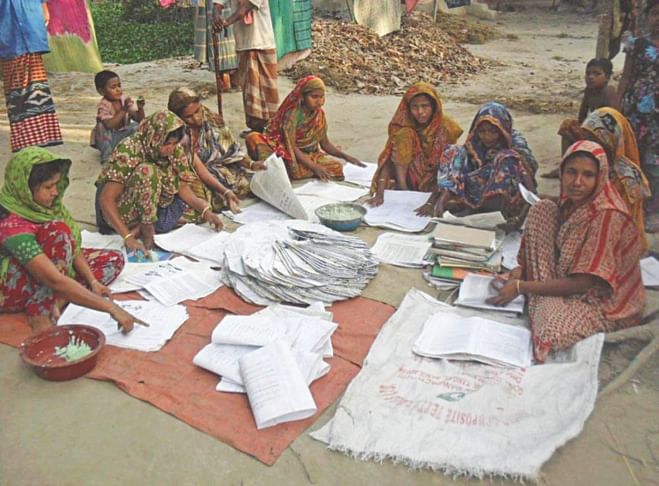Turning beggars into dignified earners
Turning beggars into dignified earners

Majeda Begum, wife of a day labourer at Telikhali village under Sadar upazila, now earns enough to send her two daughters to school, thanks to the government's Recall Project to arrange income generating activities for ultra poor rural women.
"I earn Tk 3000 to 4000 a month by selling paper bags prepared by myself. It has brought solvency to our family. Moreover, I can now send my daughters Hawa, 10, and Habiba, 5, to school," said Majeda, 40, who could not continue her study after primary education.
Mizanur Rahman, an official of NGO Wave Foundation, implementing Recall Project funded by Rural Development and Cooperatives Ministry, inspired her to engage in profitable job.
"As per his suggestion, I started making paper bags with non-refundable Tk 3,000 received from the organisation. I can make at least 10 kg of paper bags a day and sell it for Tk 40 per kg to local shops. Often hawkers come to buy paper bags from my house," she said during this correspondent's recent visit to the village.
Several other women at the village including Piyara Begum, 42, Aleya Begum, 36, Salma Begum, 30, Jesmin Begum, 35, also changed their life by involving in the business.
Now they can also send their wards to school.
A total of 4,000 ultra poor women, most of whom earlier engaged in begging, from 101 villages under Patuakhali Sadar upazila have been brought under the project to turn them into dignified earners.
They were given Tk 3,000 to 10,000 each to engage in different types of business like making baskets from bamboo, vegetables farming, fish farming, arranging rickshaw and rickshaw vans for their husbands, under the project that started in September 2011 and to continue till August 2015, said Mizanur Rahman, coordinator of the project.